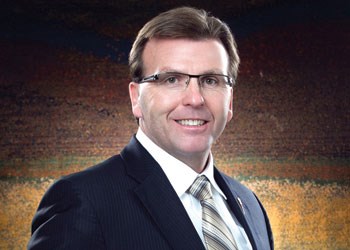The spring session has ended, and Yorkton MLA Greg Ottenbreit says it has gone well. It was an effort to keep the good things in the province going.
According to Ottenbreit the government is particularly proud to have introduced the only balanced budget in Canada. He says that part of it is making tough decisions, but it's also due to having great people, valuable resources and many advantages in the province which the province's economy running strong.
The purpose of a strong economy is to make it easier to provide services he says and in that respect the government is pleased to have introduced many of the ideas promised in the election. He notes that the Saskatchewan Advantage Scholarship provides up to five hundred dollars a year for four years to people graduating and taking post secondary in the province has been implemented, and the Active Families benefit has been increased up to the age of 18, with the PST exemption for clothing expanding to 18 as well.
Continuing in a family direction, Ottenbreit says there will be an increase of 500 child care spaces in the province. Forty-five will be coming to Yorkton.
In the medical field, there are new programs to recruit rural doctors and nurse practitioners, with large incentives to bring doctors to rural areas. One area Ottenbreit is happy to see coming to effect is the STARS Air Ambulance. He says having a mobile air ambulance and trauma team is going to be good for people, especially in rural areas.
"That's pretty exciting in itself seeing that. One of the last mornings I was in Regina, I was out for a run and saw the helicopter heading out to the east, and it was really nice to see that program taking effect. That's going to go a long way in serving the rural and industrial areas of the province, having that quick response."
The SAID income disability program is expanding with more money as well as more people on the program, increasing to 10,000 people covered.
"It adds an income source for them, but also a source of dignity, where they have a source of income that isn't termed social assistance," he details.
A source of controversy for the government has been plans to make major changes to the labor legislation, which Ottenbreit admits is a difficult piece to put together. He says they're looking at the areas which people have pointed out to them, but that changes need to be made to keep it easy to understand.
"We've come to realize how difficult it is to navigate through our labor legislation and labor standards. So what the minister has proposed is developing a labor code, putting everything in to one labor code that's easier to understand and navigate, especially for younger workers," he states.
That labor code will include some measures from the Jimmy's Law proposal. Extra workers may not be part of that, but that's because Ottenbreit says extra workers are not necessarily an advantage. He notes that in Kyle, SK there was a case where two women were killed in a similar incident.
"A lot of it, whether it's additional workers or additional security, we look at what the best practice would be to keep employees safe, and put those in the labor code."
The elimination of the film tax credit has been another source of contention, and Ottenbreit says the credit has been the type of grant that the government wants to move away from. He also says that it's money when compared to other programs, it wasn't making sense to keep it running. He says plans for a non-refundable tax credit like other businesses enjoy is more appropriate.
"Hopefully we'll find some common ground that both sides can be happy with," he adds
The increased number of MLAs is one area many people have come out against, and Ottenbreit admits it's difficult to explain why it's a good idea. He says the reason is due to the large physical size of many rural ridings.
"I know if you go down to especially the south-west, these constituencies take two and a half to three hours to drive across, and they're well over 60, 70 and even 100 miles tall. It's quite difficult to get around those constituencies to meet all those people."
With growth in the province Ottenbreit says the priority needs to be on keeping strong rural representation.
Over the summer, Ottenbreit says the plan for all MLAs is to keep in contact with constituents to share how they want to move the province and plans for the future.




